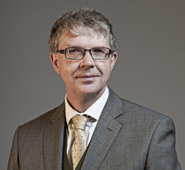As Chair of the UN Subcommittee on Prevention of Torture (SPT), Professor Malcolm Evans, of the Bristol Law School, made an oral presentation of its Annual Report to the UN General Assembly in New York this week [22 October]. He then received questions from delegates on the SPT's work. Professor Evans will be speaking at a range of other meetings at the UN during the week.
The United Nations Subcommittee on Prevention of Torture and other Cruel, Inhuman or Degrading Treatment or Punishment (SPT) is a new kind of treaty body that is composed of 25 independent experts and it has a purely preventive mandate focused on an innovative, sustained and proactive approach to the prevention of torture and ill treatment. Established pursuant to the provisions the Optional Protocol to the Convention against Torture and other Cruel, Inhuman or Degrading Treatment or Punishment (OPCAT) the SPT creates a two-pillar system, at the international and national levels, designed to prevent torture and other forms of ill treatment in all places of detention. The SPT functions at the international level while, at the national level, States must put in place one or several national, independent preventive mechanisms. The SPT assists and advises the national preventive mechanisms (NPM) about ways to strengthen safeguards relating to detention and reinforce their powers and independence.
In his presentation of the SPT Annual Report to the General Assembly, Professor Evans said “OPCAT is premised on the belief that preventing torture and ill-treatment is facilitated when national and international bodies work collaboratively.”
As a result of the OPCAT and the work of the SPT, systems for regular visiting to places of detention as part of an international system of torture prevention is now a reality in over a quarter of all states within the international community
He presented the key developments in the calendar year 2012, namely, an increase in the number of visits undertaken by the SPT, the inauguration of NPM advisory visits, and the first grants being made from the Special Fund of the OPCAT, stressing that “NPM advisory visits have turned out to be an unparalleled success, warmly welcomed by both the States Parties and the NPMs themselves. We consider the NPMs to be the ‘front line’ of torture prevention”
In order to meet the ever increasing desire of State Parties and of NPMs to work with the Subcommittee the SPT has completely restructured its Sessions, increasingly meeting in smaller regional teams and working groups to consider systemic issues related to the interaction of the Subcommittee with NPMs, as well as procedural issues, including access to places of detention. These innovative approaches enabled the SPT to cover more ground, more effectively. The SPT has been able to contribute substantively to current discussions concerning the Standard Minimum Rules for the Treatment of Prisoners, and has been actively involved in developing new approaches to the risk of reprisals arising from its visits – a subject which the SPT takes very seriously.
Professor Evans noted that “As a result of the OPCAT and the work of the SPT, systems for regular visiting to places of detention as part of an international system of torture prevention is now a reality in over a quarter of all states within the international community.”
However, the positive developments of 2012 were tempered by the disappointment of being unable to carry out one of the planned visits because of a shortage of staff within the SPT Secretariat. The SPT programme for 2013 seeks to consolidate the achievements of 2012 in two ways. First, it maintains the increased tempo of its activities by conducting a further six visits, in addition to a postponed visit from 2012. Secondly, it includes a broader range of forms of visit. The Subcommittee hopes that as a result of its innovative and evolving working practices it will become more effective and more efficient in achieving its mandate.
In his concluding remarks, Professor Evans highlighted that, in order to be able cope with the growing workload of the OPCAT related activities, the SPT needed to be serviced by a stable, core Secretariat – commenting that this had been sadly lacking in recent times, “Without doubt, the SPT is the most under-resourced of the treaty bodies and it has the equivalent of a ten year backlog of visiting. This remains incompatible with the objective of the OPCAT which is ‘to establish a system of regular visits undertaken by international and national bodies to places where people are deprived of their liberty’ (Article 1)”.
Learn more about the Subcommittee on Prevention of Torture: http://www2.ohchr.org/english/bodies/cat/opcat/index.htm
For more information or media requests, please contact Patrice Gillibert (Tel.: + 41 22 917 9332 / email:pgillibert@ohchr.org).
